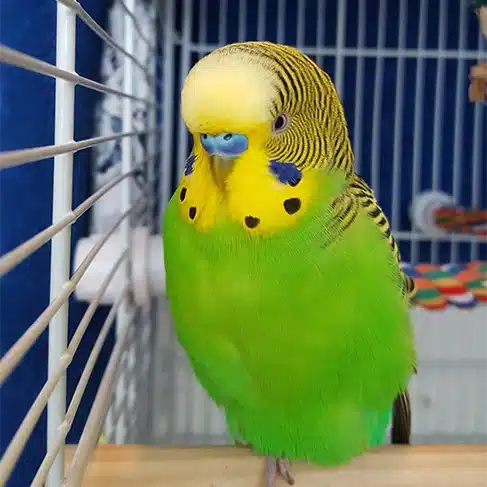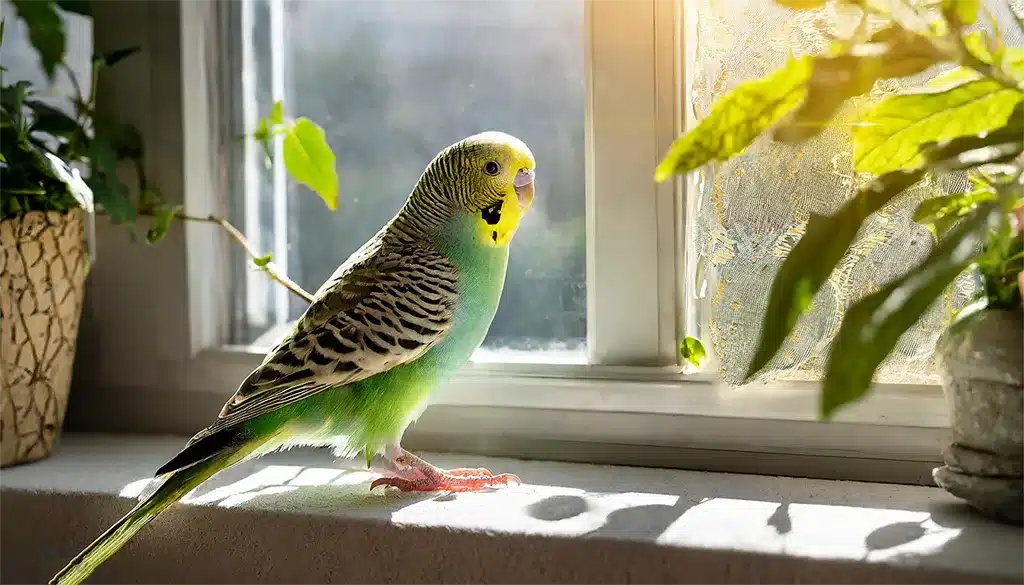Budgies’ natural habitats are in wild, open forests. Even if you keep them in a cage indoors, you need to provide an environment that meets their needs, like giving them enough natural light. So, do budgies need sunlight?
Budgies need sunlight because it contains vitamin D which is crucial to their hormonal balance. During preening, sunlight processes the oil produced in the preen gland and makes vitamin D3. Moreover, it maintains their circadian rhythms while ensuring the smooth running of the birds’ immune system.
Now that you know it is important for your budgies, read the rest of the article for the ins and outs.
Why Do Budgies Need Sunlight?
Budgies have an Australian origin. That makes them habituated to warm weather. As a result, this basic need is essential for captive budgies, too, requiring you to choose a suitable area for their cage.
And it is a basic need because sunlight directly affects their well-being. How so? Find the benefits below.
Activation Of Vitamin D3
Budgies get vitamin D3 from their food. But it will only work once they get sunlight. Once budgies receive direct sunlight and the D3 does its job, calcium enters their blood.
Therefore, they develop stronger bone growth. Plus, their internal organs perform more smoothly.
Higher Immunity
Exposure to the sun strengthens your birds’ immunity. It fends off pathogens and enables them to fight sicknesses better.
Protection Against Bacteria And Parasites
Sunlight has UV rays that help eradicate parasites and bacteria from budgies’ feathers. It also promotes healthy skin and feather growth.
Regulation Of Molting And Breeding
It is vital for budgies to have a consistent biological cycle with regular molting and breeding. Sunlight plays an important role in regulating the patterns and helps ensure they give birth to healthy chicks.
Adjustment Of Circadian Rhythms
Half an hour in the sunlight can do magic for your budgies. It keeps the circadian rhythms right. They are the behavioral, mental, and physical changes the bird goes through in a cycle of 24 hours.
So, the birds are more active and cheerful when the rhythms are in sync. Also, their appetite and health remain perfect.
How Long Should I Keep My Budgies In Sunlight?
Budgies need 12 hours of light and darkness daily to stay healthy. Light exposure is of 2 types: direct sunlight and indirect sunlight.
During the 12 hours of sunlight, 20 to 30 minutes has to come from direct exposure. It is best if you arrange it for your birds every day. If not, try to do it twice a week after every 3 days. That will be enough.
What If They Get Too Much Direct Exposure?
That will be problematic. Too much sunlight means receiving plenty of vitamin D, which translates into musculoskeletal issues.
When they suffer from hypervitaminosis D, your budgies’ calcium levels increase abnormally in their blood. That can seriously damage their bones, soft tissues, and kidneys, causing diseases like polyuria, avian gout, nephrocalcinosis, hypercalcemia, etc.
Therefore, too much vitamin D is detrimental to their health. Keep an appropriate balance.
How Do I Know If My Budgies Have Hypervitaminosis D?
Look for the following signs to be certain of hypervitaminosis D in your budgies. If you can spot at least one symptom, it is time to tone down on the sunbathing activity. Talk to a vet if it seems serious.
- They will become dehydrated and suffer from constipation.
- They will lose their appetite and vomit frequently.
- Their muscles will become weak.
- Behavioral changes, i.e., confusion and irritability, will appear.
- Their blood pressure will rise.
- There will be lots of urine.
Can My Budgies Get Heatstroke From Too Much Sunlight?
Yes, your budgies can have heatstroke in a temperature exceeding 85 to 90 degrees. The absence of sweat glands makes them highly vulnerable to prolonged direct exposure to sunlight. These are the symptoms a budgie experiencing heatstroke will show.
- Losing coordination and balance
- Rapid breathing while keeping its mouth open
- Unusually hostile behavior
- Attempting to get out of the cage
- Lifting its wings abnormally
Where Is The Ideal Place To Keep The Cage?
The best place to keep the cage is near a window with a wall behind it, or even better, between two walls. It will allow your budgies to get enough sunlight without too much exposure.
The sunlight will become too hot during summer. When the season comes, you cannot always keep the window open. It is better if the window has a blind or curtain to close it. Remember that your budgies also need darkness. Again, how much of each they receive should have a balance.
Is There Any Alternative To Sunlight?
Yes, you can arrange artificial lighting as an alternative to sunlight. But make sure the alternative lighting source emits both UVB and UVC rays.
UVA and UVB wavelengths from sunlight can reach your birds. There is UVC as well, but the ozone layer restricts it. So it is not necessary. UVA accesses the inner skin layers of budgies through their feathers, and UVB does not go further than the skin’s outer layer.
Since both are important for budgies, you should choose lighting that can mimic the natural condition.
What Factors Should I Consider When Choosing An Alternative?
See that the alternative has the following facilities.
- It does not produce too much heat. That will be the same as getting high sunlight exposure.
- It has a timer setting for exposure control.
- The size is suitable for the cage. You can put it inside, it will not take up much space.
Do The Chicks Also Need Sunlight?
No, if your female budgie has just had her chicks, they will not need any sunlight. They take a month to get out of their nesting box. They will not need the sun until they come out.
Once they grow and leave their nest, they will seek sunlight for vitamin D. Besides, it will help them fix their sleep routine. Of course, they will not need it as much as your adult budgies. But make sure they get some.

I’m Shajid Rahman, a happy owner of 6 beautiful budgies. I take care of this website to share tips, fun facts, and care guides about these birds.
Whether you’re a budgie lover or considering one as a pet, you’ll find helpful info here! I love these cute creatures, so I made this blog for Budgerigar fans. You can expect to get reliable information based on my years of experience. More About Me →

